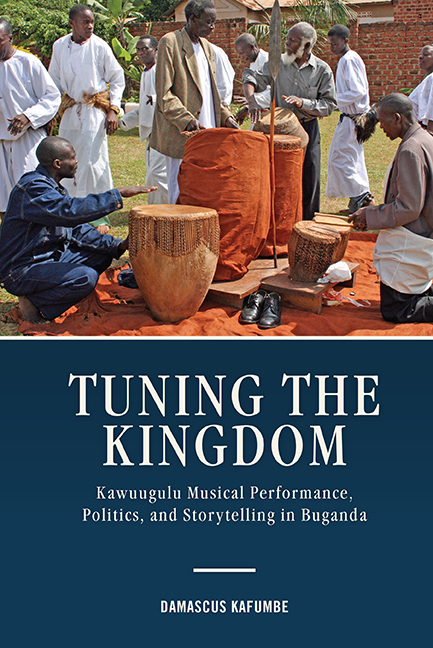Book contents
- Frontmatter
- Dedication
- Contents
- List of Illustrations
- Acknowledgments
- Note on Translation, Transliteration, and Orthography
- Note on the Musical Examples
- Preface: A Kingdom in and out of Tune
- Introduction: Kawuugulu Musical Performance, Politics, and Storytelling
- 1 The Kawuugulu Clan-Royal Music and Dance Ensemble
- 2 Kawuugulu and Intra-Clan Politics
- 3 Kawuugulu and Royal Politics
- 4 Kawuugulu and Inter-Clan Politics
- 5 Conclusion: A Performative Constitution
- Appendix A Glossary
- Appendix B Author Interviews
- Notes
- Works Cited
- Index
1 - The Kawuugulu Clan-Royal Music and Dance Ensemble
Published online by Cambridge University Press: 09 June 2021
- Frontmatter
- Dedication
- Contents
- List of Illustrations
- Acknowledgments
- Note on Translation, Transliteration, and Orthography
- Note on the Musical Examples
- Preface: A Kingdom in and out of Tune
- Introduction: Kawuugulu Musical Performance, Politics, and Storytelling
- 1 The Kawuugulu Clan-Royal Music and Dance Ensemble
- 2 Kawuugulu and Intra-Clan Politics
- 3 Kawuugulu and Royal Politics
- 4 Kawuugulu and Inter-Clan Politics
- 5 Conclusion: A Performative Constitution
- Appendix A Glossary
- Appendix B Author Interviews
- Notes
- Works Cited
- Index
Summary
The Kawuugulu Clan-Royal Music and Dance Ensemble is commonly known by one of the collective names of its dances, Amaggunju. A rough translation of Amaggunju is “dances associated with the ggunju,” an interpretation that highlights the Butiko Clan leader’s, the ggunju’s, historical duty of overseeing Kawuugulu's performance practice and facilitating its development. The ensemble's official name, Kawuugulu, is mainly used by Aboobutiko and serves as a cover term for all aspects of Kawuugulu practice: sound and non-sound instruments, drumbeats, songs, dances, performers, and stories.
The name originally belongs to one of Kawuugulu's two twin principal drums, Kawuugulu. A diminutive form of the Luganda word for “owl,” kiwuugulu, the drum name Kawuugulu confirms Alan Merriam's observation that some musical instruments are “harbingers of certain kinds of messages of general import to the society at large.” In Buganda, an owl's cry is a bad omen and portends disaster, particularly death. Accordingly, the ensemble name Kawuugulu highlights Aboobutiko's association with the kabaka’s, king’s, spiritual life and Kawuugulu's responsibility to warn of potential danger ahead of his processions.
Before the 1966 attack by the central government on the Kingdom of Buganda's main palace (lubiri) and the 1967 abolishment of all Ugandan kingdoms, Kawuugulu was one of many performing groups that served the kabaka. The attackers killed many of the performers in these groups and destroyed important musical instruments, but Kawuugulu survived partly because it never resided permanently in the palace. Since the revival of the ensemble's royal performances in the early 1990s, it is one of two active Kiganda royal musical ensembles, the second one being the Mujaguzo Drums of Kingship. This chapter introduces Kawuugulu with a focus on its political agency in twentieth- and twenty-first-century Buganda and the impact of missionization, colonialism, and postcolonial conflict on its practice during these eras.
The Ensemble Drum Set and Performance Paraphernalia
The core of Kawuugulu is a set of six drums. As we shall see in the following chapters, these drums have a hierarchy, each drum or drum pair has a unique history, and each drum's name has a specific meaning that highlights its history. The Kawuugulu drum set is incomplete without a royal spear known as Kawawa, which serves as a marker of the Kawuugulu Ensemble's royal status.
- Type
- Chapter
- Information
- Tuning the KingdomKawuugulu Musical Performance, Politics, and Storytelling in Buganda, pp. 25 - 42Publisher: Boydell & BrewerPrint publication year: 2018



